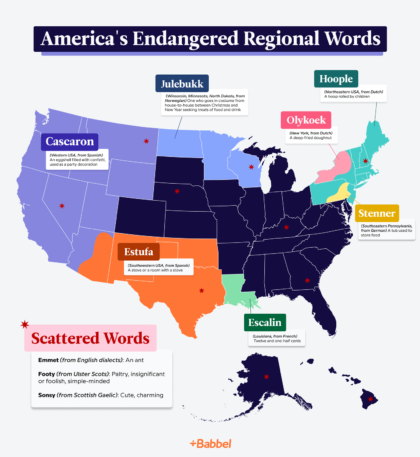If you’re feeling like a footy emmet these days, know that sonsy Julebukk season will soon be here and you can celebrate with an olykoek.
Huh?!?
The vocabulary that gave you pause includes endangered words that were once popular in various regions around the United States, but are now barely used. We bet you six escalins that you won’t recognize a single one.
The University of Wisconsin–Madison’s Dictionary of American Regional English put together a roster of 10 words with foreign-language origins, commissioned by the language-learning app Babbel.
Here’s the endangered-word list:
- Cascaron: Decorative confetti-filled eggshell. Primarily the West. Spanish.
- Emmet: Ant. Scattered. Old English.
- Escalin: 12.5 cents. Louisiana. Dutch/Spanish/French..
- Estufa: Stove or room with a stove. Mostly the Southwest. Spanish.
- Footy: Foolish. Scattered. Ulster Scots/English.
- Hoople: Toy hoop. Primarily the Northeast. Dutch.
- Julebukk: Costumed person who visits various homes between Christmas and New Year’s for treats. Primarily Wisconsin, Minnesota, and North Dakota. Norwegian.
- Olykoek: Deep-fried doughnut. New York. Dutch.
- Sonsy: Cute or charming. Scattered. Scottish Gaelic.
- Stenner: Food storage tub. Southeastern Pennsylvania. Pennsylvania German.
At issue is what’s called conversational extinction, and the company wants to help save these words.
“Babbel approached DARE about building the list with a view to preserving the conversational use of words that are barely (if ever) seen in current news articles or on social media, and are, in some cases, believed to be still in use by just a handful of speakers in the U.S.,” the company says in a written statement. “By documenting and honoring these unusual expressions and their origins, Babbel hopes that the unique linguistic quirks that are so key to the individual identities of regional culture might be preserved for future generations.”
Not everyone is despondent over these 10 words’ denouement and weeping over a copy of Beowulf.
K. David Harrison, a Swarthmore College professor of linguistics, says word life cycles are normal, especially in English, which borrows many words from other languages—either to fill a lexicographic gap or because it’s simply a cool word with greater expressive power.
“Languages do what their speakers need them to do and they talk about what speakers need them to talk about,” he explains. “New words constantly come in. Remember when ‘selfie’ didn’t used to be a word? Now, it’s one of the most popular words.”
Language, after all, is always evolving, adapting to the world in which it functions. As it acquires new words, old ones become obsolete.
“It’s constant changing and innovating. You can collect them and put them in a book, but you can’t engineer people to use them,” Harrison adds. “You read Shakespeare and every other line, you come across a word that’s English that you don’t necessarily know or use and you have to look it up. Is it sad we lost all those Elizabethan words? Maybe, but we’re still talking and communicating and producing art and poetry.”

Recognize your brand’s excellence by applying to this year’s Brands That Matter Awards before the early-rate deadline, May 3.
